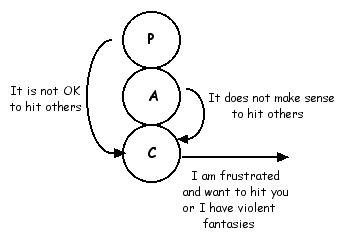It seems safe to say that fantasy or daydreaming is primarily a cognitive task. It involves thinking about stuff. So how is this different to memory? Memory is also a cognitive exercise that involves the recollection of past events but it has nothing creative in it where as fantasy does. Fantasy has to involve the fantasizer being creative and thinking up new ideas where as memory does not. Memory involves no creative thinking.
However it should be noted that memory and fantasy can often go together. Each of us at some time has recalled a past event (memory) and then fantasised about what I really wanted to do and say in that situation being recalled. As psychological research shows human memory is very fallible and is notoriously unreliable. This may explain one way by which it can become unreliable.
Memory + fantasy = new memory.
Over time the person comes to believe the recollection of the facts of what happened is indeed a recollection of the facts that did happen plus fantasising about the event.

The other thing about fantasy is that it has to result in some kind of mood change or serve the person some kind of psychological advantage. It seems safe to say that over time a person will not engage in a cognitive task if it does not benefit him in some way.
Thus we have three main characteristics of fantasy:
It is a cognitive process
It involves creative thought
It causes some change in mood or leads to some kind of psychological advantage
It is sometimes said that the more intelligent are more likely to be neurotic. From my observations I would tend to agree with this truism. The more intelligent one is the more they can think up the thoughts required for a neurosis to exist. If the person who reports a snake phobia is asked what they think about snakes they may say something like they are all slithery and slimy and hide and jump out at you when you don’t expect it. The person of low IQ is less able to think up all the bad things just cited about snakes.
With this in mind we now can assess a persons ability to fantasise and indeed their propensity to use fantasy as a way to cope or use it neurotically.

IQ + CQ = FQ
Intelligence quotient + creativity quotient = fantasy quotient
The higher the intelligence and the more able one is to think creatively the more propensity one has to fantasise.
Magical thinking and fantasy
Are these the same thing? Magical thinking in the technical sense involves a person believing something that is magical. If they do or say something that will result in some outcome that defies the laws of nature. For instance a man who prays three times every night as he believes it will prevent his mother from dying. Or the father who believes if he has angry thoughts about his daughter she will get ill. If a woman walks under a ladder she is convinced she will suffer bad luck.
These could be seen as fantasy thinking and thus one could say that fantasy is a central part of magical thinking. It transcends from fantasy to magical thinking when the individual ceases to realise it is fantasy and takes it to be factually true.

Fantasy and behaviour
This is a misunderstood area that has caused much consternation over the years. It is not uncommonly presented by clients in therapy and most often relates to sexual or violent fantasies.
I recall recently a woman presented with what she referred to as a phobia of sharp implements. She reported being very frightened to open the draw in her kitchen and seeing the sharp knives. After further investigation it was discovered this caused much anxiety because when she saw the knives she would have thoughts of stabbing someone with them. She was most concerned that she would stab someone.
Indeed it was not really a phobia of sharp knives, instead she was frightened about the violent fantasies she had which were precipitated by viewing the knives. She was concerned that because she had violent thoughts that meant she was going to act on them. Not an uncommon connection which a lot of people make.
However it is a quite erroneous connection to make. Fantasy and behaviour are two quite different things, that involve two quite different psychological processes. The vast majority of people who have violent fantasies will never live them out and behave in a violent way. To be physically violent to others one has to have a particular psychological make up. One has to be under socialised. This diagram shows the usual socialised individual:

The vast majority of people have this psychological make up at least to some degree. There are specific groups who don’t, such as many in the prison system. In society in general the vast majority of people are socialised to not physically hit others. The person may feel frustrated such that the Free Child ego state wants to hit out or they may have violent aggressive fantasies. The vast majority of people have such aggressive or violent fantasies at some point and they will never act on them.
Their Parent ego state has been socialised such that it thinks hitting others is not right or an OK thing to do. Also the Adult ego state knows if you hit others you may be charged by the police with assault. Thus they never act on such violent fantasies.
As an example. Have a violent fantasy now and make it a good one where you can be as violent as you want. Of course you can, its JUST a fantasy. In fact have six violent fantasies in a row and draw pictures of them all one after the other. Then walk outside the house into the public. Are you going to hit anyone? I wouldn’t because I don’t want to hurt others and also I don’t want to waste a lot of time and money dealing with police, lawyers, courts and so forth. I have better things to do with my time and money.
Violent fantasy does not equate to violent action. If there is no parental socialisation against hitting out then there may be. If the persons thinking does not allow for the Adult controls to take effect then there can be. This is a very small group of people. The vast majority of people are adequately socialised in this way. It is not about the violent fantasy its about the structure of the personality of the individual having the fantasy.
I asked of my client who was scared of sharp knives.
Have you any criminal record?
Have you ever been charged with assault?
Have you been questioned by the police?
Have you ever stabbed someone or been physically violent in the past?
As a child were you ever physically cruel to animals or kill any?

Of course she answered ‘No’ to all of these. She has no history of any physical violence at all, in fact she is a kind and caring woman. That means it is extremely unlikely she will at the age of fifty years suddenly have a violent outburst and stab someone with a sharp knife. Instead she allowed herself to have all the violent fantasises she wanted, worked on some anger issues she had and that was the end of that problem.
What I am suggesting above is a fantasy is just a fantasy, simply a particular series of thoughts about something that does not mean the person wants to live it out in real life. Sometimes even the scientific literature fails to see this.
The psychological literature is interesting at times. It has certain things deeply embedded in it that the general public rarely hear about. Although quite interesting the press seem to avoid it for what ever reasons they have.
Over the years a significant body of research has evolved on the topic of rape fantasies which women have. A 2009 article in the Journal of Sex Research found that:
62% of women have had a rape fantasy
The average frequency of such fantasies is 4 times per year
14% of women who have such fantasises have them at least once per week.
9% find the fantasies complete aversive (fearful)
45% find them completely erotic
46% find them both aversive and erotic
There is some considerable variety in the content and form which these fantasies take.
These fantasies are of particular interest to psychologists because why would women have fantasies about something so repugnant? Two explanations have been proposed to answer this question.
1. These fantasies tend to occur in women with high sex guilt. Because the fantasy involves force she cannot be blamed for its sexual content.
2. They are just the natural expression of an open and guilt free approach to sexuality.
To my mind the question just cited fails to make the distinction between rape in real life and fantasy rape. As I have suggested above they are two quite different things. A fantasy is simply a series of creative thoughts that has little meaning for actual behaviour (in most instances). However as I have mentioned before they can be useful diagnostically.
My explanation for women having rape fantasies has little to do with actual sex. Rape is more about power than about sex. The rapist in real life has power issues that have become eroticised. I would see the same in rape fantasies. The woman has power and control issues. It may be that she feels she has little power and control in her life and she has eroticised that. On the other hand she may be the powerful one in the relationships in her life but she desires to be the dependent one and has eroticised that. There maybe many other things which the fantasy may mean depending on the actual content and form of the rape in the fantasy.
This post has sought to define what fantasy is and what are some of the features of fantasy. Fantasy is used for a whole variety of psychological reasons and that will probably be the content of Final Fantasy 3. For those of you who don’t know Final Fantasy is a very popular video game.
Graffiti
I have played many of the FF games on my Playstation. The series are my favourite from the role playing genre.
ReplyDeleteThey're fairly decent movies (animations) too.
ReplyDeleteHiya Roses. Long time no see. I hope you are well. I have never fancied watching the animations.
ReplyDeleteXxx.
Yes Roses and Kahless,
ReplyDeletethey do have some awesome animations
Graffiti